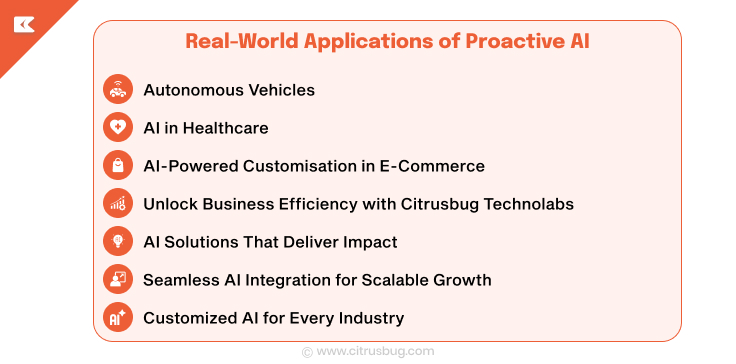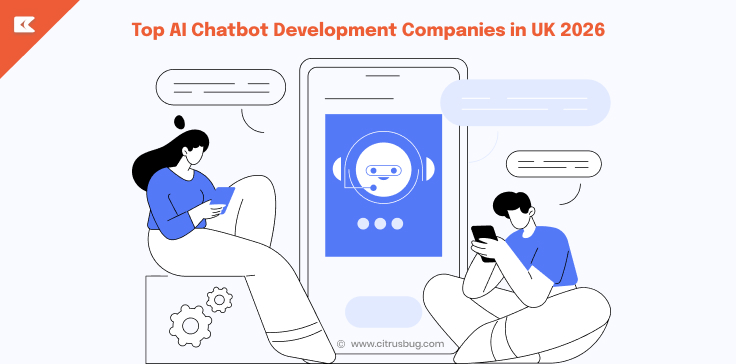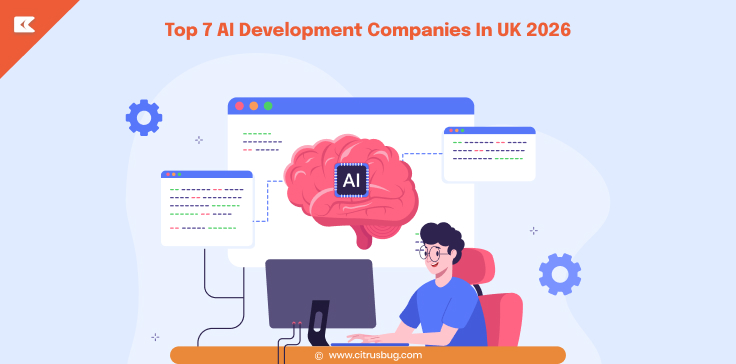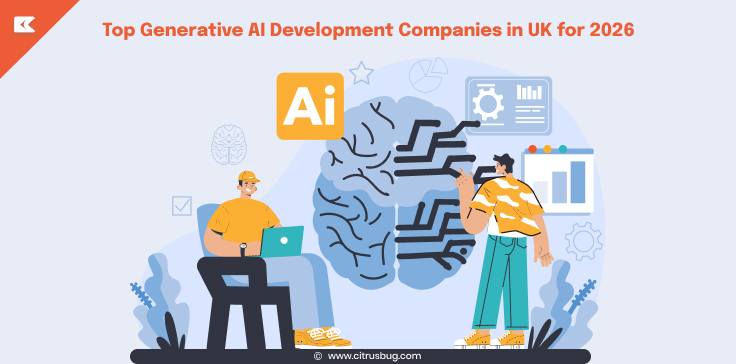The Role of Proactive AI Agents in Business Efficiency
- April 4, 2025
-
2452 Views
- by Ishan Vyas
Table of Contents
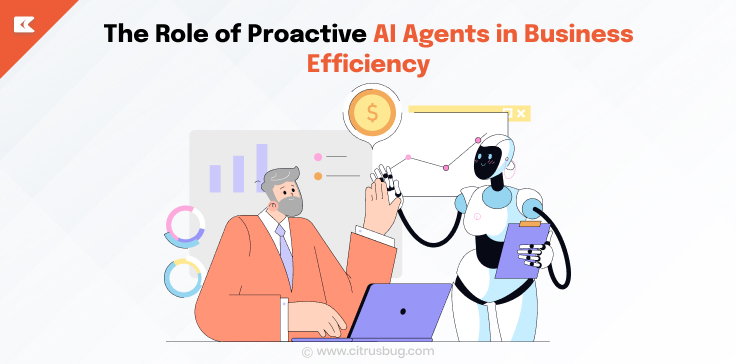
Imagine having a workforce that can perform a wide range of corporate functions with little supervision or training, is available 24/7, and scales to meet user and customer expectations. Businesses ranging from one-person startups to large corporations can use autonomous artificial intelligence models to improve customer and employee experiences, boost productivity, and revolutionise business operations by utilising artificial intelligence, especially AI agents in business.
AI agents will soon be present at your workplace, as 92% of businesses intend to boost their AI investments over the next three years. What will your new AI agent colleagues do, though? This is only the start. This is what you should know.
What Are Proactive AI Agents?
From basic rule-based systems to more intelligent models that are capable of analysis, prediction, and action, artificial intelligence has advanced significantly. At the forefront of this development are proactive AI agents, which go beyond conventional, reactive AI to create autonomous, need-anticipating systems. However, what are proactive agents and how do they work in real-world applications?
The ability to take action based on predictive analytics is the main feature of proactive AI agents. These agents examine trends, learn from data, and make decisions that anticipate human demands, in contrast to typical systems that respond to orders. Additionally, they are flexible, constantly gaining knowledge from fresh information to improve their forecasts and strategies. By improving the smoothness and intuitiveness of interactions, this flexibility improves the user experience.
How Proactive AI Agents in Business Differ from Reactive AI Agents?
Reactive AI agents cannot learn from previous interactions and instead function according to a predetermined set of rules. They react to particular instructions or cues without taking the situation or past exchanges into account. Simple chatbots and automatic response systems, where the range of interaction is constrained and tightly regulated, frequently use this kind of AI.
The way proactive and reactive AI agents engage with users is where they fundamentally differ from one another. Proactive agents anticipate requirements and take action based on data-driven insights. Reactive agents, on the other hand, are incapable of anticipating future needs and can only react to immediate inputs.
Proactive AI agents greatly improve the user experience, which offer prompt, individualised solutions. A proactive AI in a smart home, for instance, might modify the heating system without human input in response to user preferences and weather forecasts. A reactive AI, on the other hand, would need a clear command to make these changes. This proactive rather than reactive strategy improves user happiness and efficiency while also saving time.
How AI Agents for Business Work?
Business AI agents carry out activities and resolve issues by utilising cutting-edge technology including machine learning, Natural Language Processing (NLP), domain-specific big language models, and Foundation Models (FMs). In order to perform better, AI agents, including white label AI agents, can also cooperate with other agents, use different software platforms, and gain knowledge from other experiences.
Intelligent agents use a reasoning process that is similar to human thought processes to handle ambiguous requests, comprehend the task context, weigh and select the best option, and take the appropriate action. This is in contrast to typical business automation workflows that must be specially designed using predefined rules. In systems based on multi agent hyperautomation, multiple agents can work together, each handling specific tasks or decisions, allowing processes to adapt dynamically as conditions change. Additionally, a lot of AI agents can engage with a greater variety of inputs, such as text, speech, photos, and video, thanks to their multi-modal capabilities.
Types of Proactive AI Agents
AI agents that are proactive are made to forecast demands and take independent action to meet them before they become problems. These agents are becoming more and more important in a variety of industries, including manufacturing, healthcare, and technology. They improve efficiency and cut expenses in addition to streamlining operations. Personal assistants and predictive maintenance tools are two well-known categories of proactive AI agents that we examine below.
Personal Assistants
-
Functionality and Evolution
Over the past ten years, AI-powered personal assistants have undergone tremendous change. These systems may initially do basic functions like playing music or sending reminders. These days, they offer a smooth contact experience when incorporated into smartphones, home automation systems, and even automobiles. They can deliver real-time information, manage calendars, conduct conversations, and even offer suggestions based on user preferences and historical actions.
-
Impact on Daily Life
Personal assistants powered by AI have a significant impact on day-to-day living. They provide individualised experiences and boost efficiency by managing repetitive tasks, freeing users to concentrate on more intricate pursuits. To successfully understand and anticipate consumer wants, for example, natural language processing and machine learning are used by assistants such as Siri, Alexa, and Google Assistant. They can automate a variety of tasks, such as making appointments and placing online grocery orders, greatly streamlining consumer interactions with technology.
Predictive Maintenance Tools
-
Preventive Strategies and Technologies
One crucial use of proactive AI in the industrial sector is predictive maintenance tools. These tools anticipate equipment breakdowns before they happen by using machine learning and AI algorithms and data analytics. AI can spot trends and abnormalities before malfunctions by examining both historical data and real-time inputs from machinery. By reducing the downtime and expenses related to routine or emergency maintenance, this capability enables firms to carry out maintenance only when required.
-
Benefits in Industrial Applications
Predictive maintenance solutions have significantly reduced costs and increased efficiency in sectors like manufacturing, aerospace, and automotive. These instruments improve safety and lessen the environmental effect of production operations in addition to extending the life of equipment. Businesses can schedule maintenance during off-peak hours, reduce production disruptions, and maximise resource utilisation by anticipating equipment failures. In industrial operations, this proactive approach is revolutionising conventional maintenance procedures and establishing new benchmarks.
Healthcare Monitoring Systems
-
Remote Patient Monitoring
Healthcare monitoring systems are crucial in providing continuous care to patients outside of traditional medical settings. Remote patient monitoring (RPM) involves the use of digital technologies to collect medical and other health data from individuals at one location and electronically transmit that information securely to healthcare providers at a different location. RPM allows for constant monitoring of patients with chronic conditions, reducing the need for frequent hospital visits and enabling early detection of complications. Discover more about AI’s role in Healthcare Automation.
The Benefits of AI Agents in Businesses
AI agents can assist businesses in automating a variety of jobs in many sectors, such as operations, marketing, finance, IT, and logistics. These agents will go from job execution to more independent decision-making and proactive problem-solving of business issues without human involvement as agentic AI develops. Advantages consist of:
- Operational efficiency:
By letting AI take care of tedious, repetitive tasks, AI agents for small and large firms can help teams stay focused on high-value tasks while increasing worker performance by over 40%.
- Cost savings:
Businesses can cut labour expenses and avoid expensive human blunders by assigning AI agents to handle difficult, high-volume, time-consuming jobs. For example, Gartner estimates that within the next two years, AI will assist contact centres in cutting expenses by $80 billion
- Enabling data-driven decisions:
Real-time analysis of large datasets by AI agents in business can reveal trends and insights that support use cases like supply chain optimisation and financial forecasting.
Real-World Applications of Proactive AI
Proactive AI has changed the world; it is no longer abstract. The following amazing real-world examples demonstrate how these systems are already revolutionising many industries:
Autonomous Vehicles
One of the most prominent examples of proactive AI is self-driving automobiles. These cars negotiate roadways, predict challenges and make judgements in real time using a combination of sensors, cameras, and artificial intelligence algorithms. Human error is a major contributor to traffic accidents, and this technology seeks to eliminate it in order to revolutionise transportation.
For example, autonomous cars from Waymo and Tesla’s Autopilot continuously scan their surroundings, respond to shifting road conditions, and make judgements in real time such as changing speed or rerouting based on traffic.
AI in Healthcare
Proactive AI systems in the healthcare industry, like IBM Watson Health, evaluate vast amounts of medical data to suggest therapies, make real-time diagnosis recommendations, and anticipate possible health hazards before they become serious. These artificial intelligence (AI) agents are able to identify patterns that humans might miss.
AI-Powered Customisation in E-Commerce
Two excellent examples of proactive AI in action are Amazon and Netflix. Based on past purchases, queries, or viewing habits, these platforms employ artificial intelligence (AI) to forecast what consumers may desire next. Customers are therefore given extremely appropriate recommendations without having to look for them.
Unlock Business Efficiency with Citrusbug Technolabs
We at Citrusbug Technolabs are enthusiastic about using AI and machine learning to drive company success. To ensure a smooth implementation, our team offers end-to-end AI consulting services, whether you’re looking into how to create an AI agent or need estimates for the cost of AI development. Here’s how we can assist:
AI Solutions That Deliver Impact
Beyond automation, we develop proactive AI agents that anticipate, adjust, and maximise. We help you remain ahead of the competition in a competitive marketplace with anything from smart process automation to predictive analytics.
Seamless AI Integration for Scalable Growth
AI adoption doesn’t have to be difficult. We guarantee a seamless transition by seamlessly incorporating AI solutions into your existing systems, allowing you to concentrate on expanding your company.
Customized AI for Every Industry
We provide AI solutions that are suited to the unique problems faced by your sector, whether it be healthcare, banking, e-commerce, or logistics. Solving real-world problems and achieving measurable outcomes are our objectives.
You may achieve AI-driven efficiency with Citrusbug Technolabs. Are you ready to secure your company’s future? Together, let’s create scalable, intelligent solutions.





 SaaS Development
SaaS Development Web Application Development
Web Application Development Mobile Application Development
Mobile Application Development Custom Software Development
Custom Software Development Cloud Development
Cloud Development DevOps Development
DevOps Development MVP Development
MVP Development Digital Product Development
Digital Product Development Hire Chatbot Developers
Hire Chatbot Developers Hire Python Developers
Hire Python Developers Hire Django Developers
Hire Django Developers Hire ReactJS Developers
Hire ReactJS Developers Hire AngularJS Developers
Hire AngularJS Developers Hire VueJS Developers
Hire VueJS Developers Hire Full Stack Developers
Hire Full Stack Developers Hire Back End Developers
Hire Back End Developers Hire Front End Developers
Hire Front End Developers AI Healthcare Software Development & Consulting
AI Healthcare Software Development & Consulting Healthcare App Development
Healthcare App Development EHR Software Development
EHR Software Development Healthcare AI Chatbot Development
Healthcare AI Chatbot Development Telemedicine App Development Company
Telemedicine App Development Company Medical Billing Software Development
Medical Billing Software Development Fitness App Development
Fitness App Development RPM Software Development
RPM Software Development Medicine Delivery App Development
Medicine Delivery App Development Medical Device Software Development
Medical Device Software Development Patient Engagement Software Solutions
Patient Engagement Software Solutions Mental Health App Development
Mental Health App Development Healthcare IT Consulting
Healthcare IT Consulting Healthcare CRM Software Development
Healthcare CRM Software Development Healthcare IT Managed Services
Healthcare IT Managed Services Healthcare Software Testing services
Healthcare Software Testing services Medical Practice Management Software
Medical Practice Management Software Outsourcing Healthcare IT Services
Outsourcing Healthcare IT Services IoT Solutions for Healthcare
IoT Solutions for Healthcare Medical Image Analysis Software Development Services
Medical Image Analysis Software Development Services Lending Software Development Services
Lending Software Development Services Payment Gateway Software Development
Payment Gateway Software Development Accounting Software Development
Accounting Software Development AI-Driven Banking App Development
AI-Driven Banking App Development Insurance Software Development
Insurance Software Development Finance Software Development
Finance Software Development Loan Management Software Development
Loan Management Software Development Decentralized Finance Development Services
Decentralized Finance Development Services eWallet App Development
eWallet App Development Payment App Development
Payment App Development Money Transfer App Development
Money Transfer App Development Mortgage Software Development
Mortgage Software Development Insurance Fraud Detection Software Development
Insurance Fraud Detection Software Development Wealth Management Software Development
Wealth Management Software Development Cryptocurrency Exchange Platform Development
Cryptocurrency Exchange Platform Development Neobank App Development
Neobank App Development Stock Trading App Development
Stock Trading App Development AML software Development
AML software Development Web3 Wallet Development
Web3 Wallet Development Robo-Advisor App Development
Robo-Advisor App Development Supply Chain Management Software Development
Supply Chain Management Software Development Fleet Management Software Development
Fleet Management Software Development Warehouse Management Software Development
Warehouse Management Software Development LMS Development
LMS Development Education App Development
Education App Development Inventory Management Software Development
Inventory Management Software Development Property Management Software Development
Property Management Software Development Real Estate CRM Software Development
Real Estate CRM Software Development Real Estate Document Management Software
Real Estate Document Management Software Construction App Development
Construction App Development Construction ERP Software Development
Construction ERP Software Development






